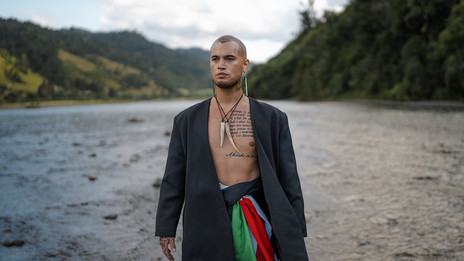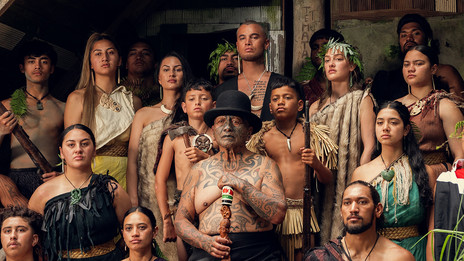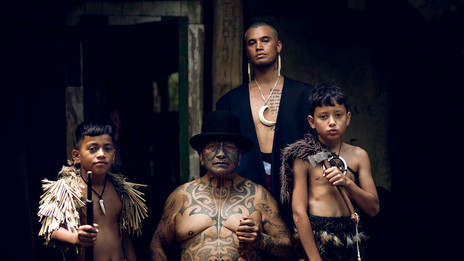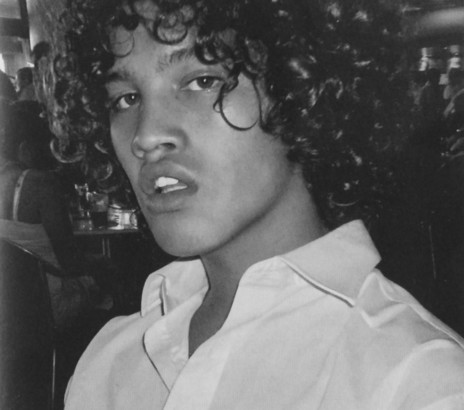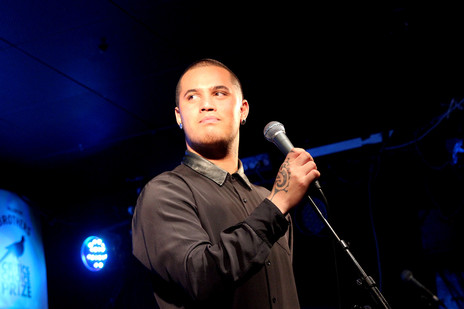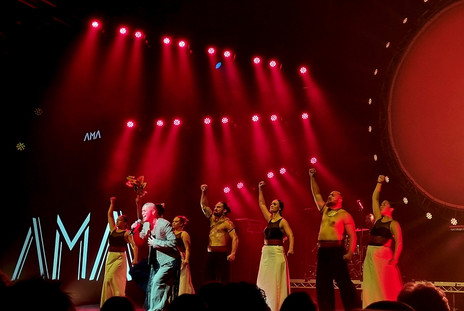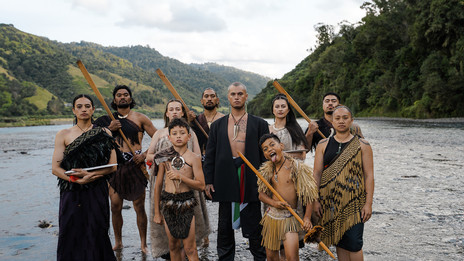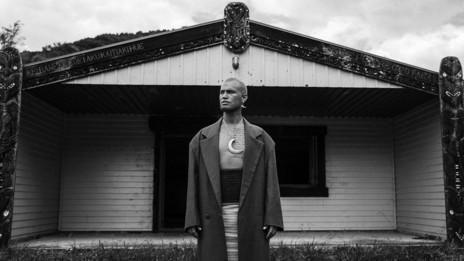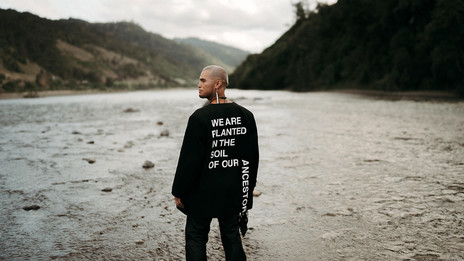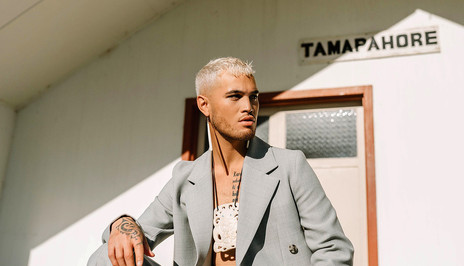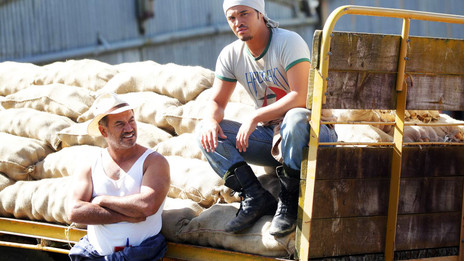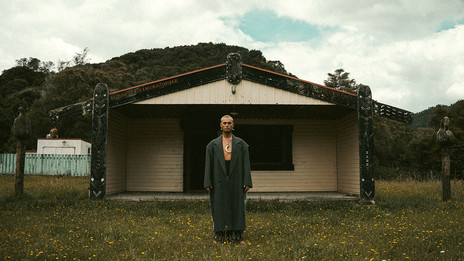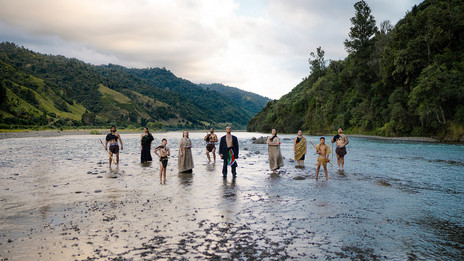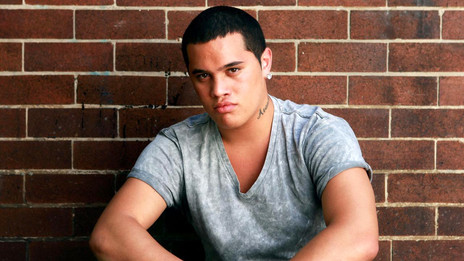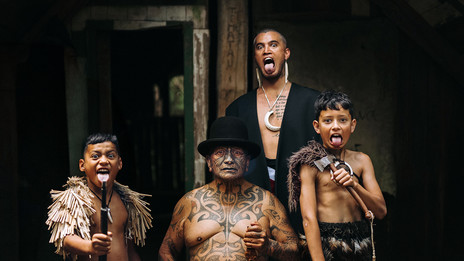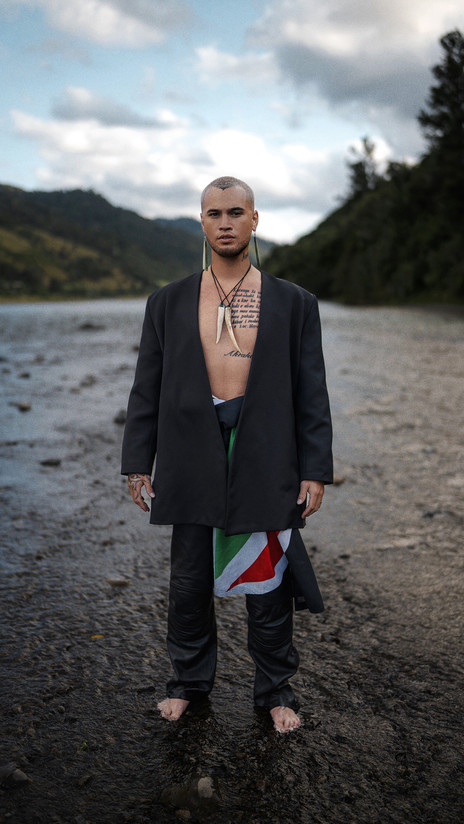The date that Walker’s life changed was 22 November 2009, when the final of Australian Idol was broadcast to over 1.5 million viewers. While they awaited the judges’ decision, Walker leant over to the other remaining finalist Hayley Warner and whispered, “It’s you.” She replied, “It’s you!”
Throughout the season, Walker had often chosen songs by female artists (Alicia Keys, Rihanna, Beyoncé) to showcase his versatility. It caused occasional hiccups, as when he misheard the intro to the Pink song ‘Hello Mister President’ and entered in the wrong key. Still, the judges admired his willingness to take a risk and announced him as the winner, making him the first person born and raised in Aotearoa to win the competition.
At the time, Walker was sleeping on his brother’s couch and working at a men’s clothing store in Coolangatta. His upbringing in Mount Maunganui had been harsh. He suffered violent beatings from his father and during the family’s brief time in Australia as a child, he was sexually abused by a cousin. He would later recount these years in his autobiography Impossible, which detailed how his experiences led him into wild teen years of shoplifting, home break-ins, and endless trouble at school.
His prospects for making a success of himself certainly did seem impossible at first, but his parents found Christianity, which gradually improved his home life, and then he found his own faith. This helped give him the courage to enter Idol. His upbringing might have been harsh, but it was his whānau and connection with his marae that would help centre him for what was ahead.
Pop star rollercoaster
Stan Walker’s debut single ‘Black Box’ was a newly written song chosen for him by Sony, who signed him to a record deal as Idol winner (with $200k to be spent on promotion). The song didn’t make much use of his singing ability, but it was eminently catchy, without being overly sugary. It debuted at No.1 in New Zealand and No.2 in Australia, going double-platinum in both countries. The day after winning the final, Walker went into the studio and spent two days recording the rest of his debut album, Introducing Stan Walker (2009).
The album was largely made of songs he’d covered on the show, the standouts being ‘Purple Rain’ and ‘Amazing Grace’. The only other original, ‘Think of Me’, was produced by Guy Sebastian, who Walker had watched on television when he won the first Australian Idol back in 2003. As a child, Walker had been inspired by seeing a person of colour (Malaysian/Indian) winning the competition – to work with him was a special moment.
As a child, Walker had been inspired by seeing a person of colour win ‘Australian Idol’
Walker would later see this early work as cringeworthy, but the album was certainly a massive hit, going platinum in Australia and double platinum at home. He worked hard to promote it, while also fitting in time to visit Haiti to highlight the work Compassion Australia was doing to support the country in the wake of a devastating earthquake.
Within a year, he was back in the studio to record a follow-up album, Inside Out (2010), and this time he was able to put more of himself into the work, co-writing nearly a third of the songs, including the title track. He also connected with the music scene back home by agreeing to do a song ‘Stuck In A Box’ with Auckland street rapper Young Sid (aka Sidney Diamond). The song had a hook written by Sid’s Smashproof bandmate Tyree and a beat by US producer Emile (who had previously worked with Kanye West and Eminem). It went Top 20 at home and was added to Inside Out, though the album’s big hits on both sides of the Tasman were the upbeat love songs ‘Unbroken’ and ‘Choose You’.
Walker finally returned home for his first tour in 2011, as well as appearing at the Christian festival Parachute, even while his career still centred on Australia. To keep the momentum up, he moved directly on to a third album, Let The Music Play (2011). He flew to LA to work with songwriters Stephen Wrabel, Jon Asher, and Drew Pearson, also taking the chance to film a video for a song he recorded with them, ‘Loud’. It gave him another cross-Tasman Top 10 hit.
In the interim, he had befriended former Australian Idol winner, Jessica Mauboy, with the pair bonding over their shared experience as overnight pop stars who had managed to make a career of it. He also admired her for becoming an actress (in the movie The Sapphires), given that he also aspired to do screenwork. Their song together ‘Galaxy’ cemented Walker’s place in the Australian music scene and the pair undertook an extensive tour together in early 2012. Later that same year Walker headed out across Australia as support act for Nikki Minaj.
Let The Music Play hinted at Walker’s growing confidence as a songwriter. He cowrote seven of the 11 tracks, including the cross-Tasman Top 40 single ‘Music Won’t Break Your Heart’. Walker was gaining some control of his career, but in order to attain creative freedom he needed to recreate public perception of who he was as an artist.
Inventing Stan Walker
In November 2012, Stan Walker was announced as a judge on a New Zealand production of The X Factor. He enjoyed working with the young acts, but found the show had a hectic production schedule and he didn’t enjoy being based in Auckland, away from his current life in Australia and his hometown of Tauranga. Walker formed a friendship with fellow judge Mel Blatt (from UK group All Saints) and when she phoned him to see if he was returning for the second season in 2015, it became a case of “if you do it, I’ll do it”.
This meant that Blatt and Walker were on the panel when the show erupted with controversy. The two other judges Willy Moon and Natalia Kills both blasted a young contestant, claiming he’d ripped off Moon’s look. Walker was horrified when Kills remained unrepentant after the show, telling him that at least it would gain her social media followers. By the following week, Moon and Kills had been fired and the series continued with two replacement judges.
Walker expanded into acting, gaining the lead role in the ‘Mt Zion’ feature film
Walker expanded the range of his career further by gaining the lead role in the movie Mt Zion (released February 2013). The film centred on a small-town band trying to get the support slot for Bob Marley’s legendary 1979 concert in Auckland. Walker’s character had similarities to the young man he’d been, though the strength of his acting was still impressive.
The film’s fictional band Small Axe needed a handful of their own songs to play, and director Tearepa Kahi wrote many of them himself, along with Shane McLean. Walker was also asked to contribute, so he worked with Australian songwriting team DNA to write ‘Take It Easy’. The song showed that Walker’s soulful pop voice sounded great against the subtle reggae groove of a live band. Nonetheless, a second edit of the song was done for radio, which removed the reggae feel and replaced the band sound with a programmed beat. ‘Take It Easy’ wasn’t seen as a potential hit in Australia, so its main impact was in Aotearoa where it went Top 5.
Walker’s fame on both sides of the Tasman led him to a new career highlight. He had always adored Beyoncé and now he would be supporting her in Sydney (three nights), Perth, and Auckland. Walker’s backing band for live shows was The Levites, a four-piece who had learnt their chops playing in church: Jacob Nansen aka Jakes (keys), Ross Nansen (drums), Junior Nansen (bass), and Inoke Finau aka Knox (guitar).
For the Beyoncé shows, Walker bulked up his backing vocalists by adding a trio of talented singers: Jacob’s wife Erica Nansen, solo artist Ria Hall, and genre-bending artist Troy Kingi. Walker and Kingi had first worked together as actors, with both appearing in Mt Zion and the Taika Waititi movie, Hunt For The Wilderpeople. Walker decided to make the shows special by performing a te reo Māori version of the Crowded House song ‘Don’t Dream It’s Over,’ so he arranged a translation by educator/artist Erena Koopu.
In the meantime, ‘Take It Easy’ was continuing to find new listeners online and was added to Walker’s greatest hits album released that year, as well as his album Inventing Myself (2013). Walker took a similar approach of fusing reggae and pop on the track ‘Bulletproof’ which he wrote with New Zealand singer Vince Harder and Nashville-based Australian songwriter Lindsay Rimes (who wrote with him for Let The Music Play).
‘Bulletproof’ struck Walker as a clear hit, but when he took it to Sony Australia they declined to release it as a single, saying the reggae vibe wouldn’t vibe with Aussie listeners. Walker instead released it as a single through Sony NZ and it became a No.2 hit at home. He was keen to work with more Polynesian/Māori creatives and brought in Shae Stirling to create the music video, kicking off a fruitful period of collaboration between the pair.
Walker increasingly began to see the future of his career being in Aotearoa
Walker increasingly began to see the future of his career being in Aotearoa, especially given his close working relationship with Jaden Parkes (Leisure) at Sony NZ – he would become director of A&R in 2020 – and the fact that X Factor had made Walker a household name. He solidified his local following through his Inventing Myself World Tour of New Zealand, which took in 23 dates.
During the tour, Walker was fooling around on a bicycle at a skatepark in Queenstown when he crashed into another rider. He was only wearing jandals and his toe was almost sliced off. At the hospital, the doctors wanted to send him to one of the main centres for an operation, but Walker didn’t want to let down his crew and his fans. He insisted the doctors stitch up the wound as best they could and then he continued the tour, heavily medicated on painkillers and with his foot wrapped in bandages under an oversized shoe. Somehow he got through the final nine shows and the toe survived.
Sony NZ was promoting another local hitmaker at the time, Ginny Blackmore. She had written songs for Adam Lambert and Christina Aguilera, before starting her own solo career. Walker agreed to duet with her on a pair of songs ‘Holding You’ and ‘I Can’t Make You Love Me’. Both became hits, with ‘Holding You’ topping the local charts and dipping into the Australian Top 50.
Walker’s focus then returned to writing his own songs. He had co-written all but two of the tracks on Inventing Myself, and for Māori Language Week in 2014, he decided to create a song in te reo Māori. Walker grew up with a moderately good understanding of the language, but felt he lacked the deeper knowledge needed to write lyrics. He worked with Vince Harder to write the song in English and then had it translated by Te Haumihiata Mason. He brought in Troy Kingi and Maisey Rika to appear on the track, hoping to create a ‘Poi E’ for the new generation of Māori youth. They came close, reaching No.2.
This success pointed a new way forward, but Sony Australia had other ideas. His original contract was for five albums, so he still owed them one more and they wanted it to be an easy listening covers collection. Walker wasn’t excited by the idea but could see that it had commercial potential. The label was at least willing to let him choose the songs, so he relented and chose a range of soul classics to modernise. Truth and Soul (2015) outdid expectations, reaching No.7 on the Australian charts and No.3 in New Zealand. With this final obligation fulfilled, Walker was now free to follow his own path.
Māori Ki Te Ao
The era of Spotify had intensified by 2016 and so many pop acts reverted to releasing singles, without the need for these to be building up to an album. This certainly made sense for Stan Walker, given the workload of the previous years and the new challenges he was about to confront. His singles ‘You Never Know’ and ‘Messages’ did well enough online to keep his momentum going.
However, behind the scenes he was struggling. His mother was diagnosed with cancer, and he cancelled an upcoming New Zealand tour to be by her side. He also broke up with his partner of three years, and without her in his life he went into a wild phase of reckless spending and partying.
out of nowhere, Walker had a surprise viral hit, ‘Tennessee Whiskey’, with Parson James
Then out of nowhere, Walker had a surprise viral hit. He had met country singer Parson James when the US artist was touring Aotearoa. James had been impressed by Walker’s singing, and the pair arranged to cover the song ‘Tennessee Whiskey’ for a NZ Herald video. It blew up, with hundreds of thousands of views. The song was hurriedly placed onto streaming services and racked up tens of millions of streams.
Walker also took part in a writing session with a team of US songwriters, though his aim was to create a song for his audience back home. ‘The New Takeover’ was intended as an anthem for himself and for his fellow Māori: "Young boy ain’t no more, I got them scars like a soldier … We gonna get it, new takeover.”
He worked with Shae Stirling and stylist Sammy Salsa to create a music video which fused modern and historic elements of Māori culture. He rides a black stallion and carries a tino rangatiratanga flag, with the backdrop provided by two wild West Coast beaches in Auckland (Te Henga/Bethells Beach and Mangawhai).
When Walker was cast in the 2017 film The Stolen directed by Englishman Niall Johnson, he was presented with a moko that had been designed by an artist in Paris and was told it would be painted on his face in black ink. Walker flatly refused to misrepresent his culture in this manner and instead insisted on being given the moko of his great-great-great grandfather Taiaho Hōri Ngātai and had it painted on in the traditional green colour. He also wrote a song for the film, ‘Find You (The Stolen)’.
The Stolen was his fourth movie as an actor, given he had also appeared in New Zealand dance movie Born to Dance, which included choreography by Parris Goebel. The following year he took a part in Australian film Chasing Comets, which had him playing an AFL athlete. Ironic casting, as his brother Noah really was an AFL player. These latter films were poorly received, which put a damper on his film career despite his natural abilities as an actor.
However, Walker’s biggest concern was his health. Since age 15, he had known that he carried a gene mutation called CDH1, which had caused 25 of his whānau to die from cancer. In 2018, it was confirmed that Walker had cancer in his stomach and would need to have it removed. He wanted to highlight the process for others in the same situation, so a few days before the surgery he contacted people he knew at MediaWorks from his time on The X Factor (NZ) and they hastily arranged to film a documentary about the operation and his recovery.
Walker’s grandfather had died from the surgery itself and even if it was successful there was no guarantee that his singing voice would retain its power. The recovery process was also extremely draining, with painful complications arising over the months that followed. Despite this, Walker managed to perform a low-key gig in Rarotonga only 14 weeks after surgery. He struggled during soundcheck but once he was in front of a crowd, he managed to draw his voice up to full strength.
Walker was unsurprisingly introspective on the 2018 EP ‘Stan’
Walker was unsurprisingly introspective on the Stan EP (2018). The opening track, ‘Thank You,’ was an ode to his mother April, who had always been a central presence in his life. She even ran his company Stan Walker Music Pty Ltd, which had helped ensure he kept financial control of his career from the start.
He responded to the Christchurch massacre by appearing at the I Am Hope concert and releasing an EP (Faith Hope Love, 2019) with the proceeds going to the families of the victims. The four songs included his te reo version of ‘Don’t Dream It’s Over’ – retitled as ‘Moemoeā’ and performed with Seth Haapu.
Aside from these two EPs, his output over these two years were largely singles. He often collaborated with other Māori acts such as Hamo Dell (Tomorrow People) on acoustic-groove based song ‘Choose’, and on Seth Haapu’s single ‘Cool Down’. Walker wrote the song ‘Give’ with Matiu Walters (Six60) and the lyrics acknowledge the wairua of his tūpuna and his kaumātua for guiding him through hard times. The video matches this sentiment by featuring his extended whānau and showing photos of those who had passed on.
Walker then released his autobiography Impossible, which explained the journey his family had been on. The 2020 book was open about the physical violence inflicted on Walker by his father, but also explained the intergenerational trauma that was behind this abuse: the anger and feeling of whakamā/shame that was a byproduct of colonisation. Walker credits their Christian faith for allowing them to remake themselves as a family. His father Ross appears proudly in the ‘Give’ video with a korowai wrapped around his neck. When the Walker family were given their own reality television show (The Walkers) in 2021, Ross was shown as the adoring grandfather playing footie with his mokopuna and doing long hours at work, despite being diagnosed with cancer.
his 2020 autobiography ‘Impossible’ explained the journey his family had been on
Walker’s musical output also looked back over his life as an artist. There was a greatest hits collection Impossible (Music by the Book) and a live recording that showed the power of his musical group, Stan Walker – Live with The Levites. Walker had covered Kanye West’s ‘Ultralight Beam’ for his Faith Hope Love EP, but it was the live rendition that truly brought out the gospel flavour of the song.
Yet Walker was far from stuck in the past. His new single that year ‘Bigger’ saw him return to the New Zealand Top 30 for the first time in four years. Then he broke new ground by recording an entire album, Te Arohanui (2021), in te reo Māori. He picked old tracks to be translated or wrote new ones, such as lead single ‘Matemateāone’. This was followed by the album All In (2022) which reached No.3 and featured appearances by JessB, Kings, and Scribe.
American film director Ava DuVernay saw the YouTube video of Walker covering ‘Ultralight Beam’ and was so impressed that she reached out to him and asked whether he would write a song for her new film, Origin. By this stage, Walker had married his former girlfriend Lou Tyson and they had begun a family, so he was more devoted than ever to providing a strong representation of Māoridom for the next generation. This led him to write ‘I AM’ with its powerful chorus in te reo Māori. It not only featured in the film, but also reached the New Zealand Top 20.
Walker’s next single ‘Māori Ki Te Ao’ was written with his uncle Donny Te Kanapu Anasta. He wanted to specifically connect with his Tūhoe ancestry so enlisted others from this side of his lineage to help with the music video, including his uncle, famous activist Tāme Iti.
The song was a perfect summary of his ongoing goal as an artist, which was to boost Māori people and their culture. The lyrics proclaimed:
“Ue / Mahuta mai rā / E tū e / Horahia / Me tuku e / Te reo Māori ki te ao.” (“Push / Rise up / Stand up / Spread it far and wide / Release / The Māori language into the world”).
